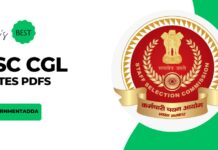General Awareness play a vital role in all Examination. we can expect Questions from different Topics.Here we have given Study Notes on ” Nature and scope of Financial Accounting ” Paper-IV for SSC CGL Examinations 2019-20. Candidates those who are all preparing for the Examination can use this study material.
ORIGIN AND GROWTH OF ACCOUNTING
Accounting is as old as money itself. However, the act of accounting was not as developed as it is today because in the early stages of civilisation, the number of transactions to be recorded were so small that each businessman was able to record and check for himself all his transactions. Accounting was practised in India twenty three centuries ago as is clear from the book named “Arthashastra” written by Kautilya, King Chandragupta’s minister. This book not only relates to politics and economics, but also explain the art of proper keeping of accounts.
However, the modern system of accounting based on the principles of double entry system owes it origin to Luco Pacioli who first published the principles of Double Entry System in 1494 at Venice in Italy .
MEANING OF ACCOUNTING
In 1941, The American Institute of Certified Public Accountants (AICPA) had defined accounting as the art of recording, classifying, and summarising in a significant manner and in terms of money, transactions and events which
are, in part at least, of financial character, and interpreting the results thereof’. With greater economic development resulting in changing role of accounting, its scope, became broader.
In 1966, the American Accounting Association (AAA) defined accounting as ‘the process of identifying, measuring and communicating economic information to permit informed judgments and decisions by users of information’
BRANCHES OF ACCOUNTING
The apparently divergent needs of internal and external users of accounting information have resulted in the development of sub-disciplines within the accounting discipline namely
- Financial accounting,
- Cost accounting and
- Management accounting
Financial accounting assists keeping a systematic record of financial transactions the preparation and presentation of financial reports in order to arrive at a measure of organisational success and financial soundness. It relates to the past period, serves the stewardship function and is monetary in nature. It is primarily concerned with the provision of financial information to all stakeholders.
Cost accounting The object of cost accounting is to find out the cost of goods produced or services rendered by a business. It also helps the business in controlling the costs by indicating avoidable losses and wastes.
Management accounting The object of management accounting is to supply relevant information at appropriate time to the management to enable it to take decisions and effect control.
Different Roles of Accounting
For centuries, the role of accounting has been changing with the changes in economic development and increasing societal demands. It describes and analyses a mass of data of an enterprise through measurement, classification
and summarisation, and reduces those date into reports and statements, which show the financial condition and results of operations of that enterprise. Hence, it is regarded as a language of business. It also performs the service
activity by providing quantitative financial information that helps the users in various ways. Accounting as an information system collects and communicates economic information about an enterprise to a wide variety of interested parties.
1) As a language – it is perceived as the language of business which is used to communicate information on enterprises;
2) As a historical record- it is viewed as chronological record of financial transactions of an organisation at actual amounts involved;
3) As current economic reality- it is viewed as the means of determining the true income of an entity namely the change of wealth over time;
4) As an information system – it is viewed as a process that links an information source (the accountant) to a set of receivers (external users) by means of a channel of communication;
5) As a commodity- specialised information is viewed as a service which is in demand in society, with accountants being willing to and capable of providing it.
SYSTEMS OF ACCOUNTING
The following are the main systems of recording business transactions:
(a) Cash System :- Under this system, actual cash receipts and actual cash payments are recorded. Credit transactions are not recorded at all until the cash in actually received or paid. The Receipts and Payments Account prepared in case of non-trading concerns such as a charitable institution, a club, a school, a college, etc. and professional men like a lawyer, a doctor, a chartered accountant etc. can be cited as the best example of cash system. This system does not make a complete record of financial transactions of a trading period as it does not record outstanding transactions like outstanding expenses and outstanding incomes. The system being based on a record of actual cash receipts and actual cash payments will not be able to disclose correct profit or loss for a particular period and will not exhibit true financial position of the business on a particular day .
(b) Mercantile (Accrual) system :- Under this system all transactions relating to a period are recorded in the books of account i.e., in addition to actual receipts and payments of cash income receivable and expenses payable are also recorded. This system gives a complete picture of the financial transactions of the business as it makes a record of all transactions relating to a period. The system being based on a complete record of the financial transactions discloses correct profit or loss for a particular period and also exhibits true financial position of the
business on a particular day.












